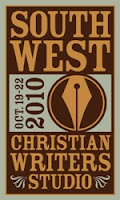Today I want to welcome Linda Mitchell. She and I met at the Southwest Christian Writers Studio and I was instantly impressed with her level of knowledge and professionalism. Linda also serves on the faculty of the Florida Christian Writers Conference.
 When I mentioned to a friend that I had chosen to attend the Southwest Christian Writers Studio in Glorieta, New Mexico, he asked, "Why this conference?"The answer was a no brainer for me, "I want something different and I think this conference has it." Like most writers, I'm on a tight budget so I put a lot of thought into what I wanted from a conference and into deciding which one would best meet my goals.
When I mentioned to a friend that I had chosen to attend the Southwest Christian Writers Studio in Glorieta, New Mexico, he asked, "Why this conference?"The answer was a no brainer for me, "I want something different and I think this conference has it." Like most writers, I'm on a tight budget so I put a lot of thought into what I wanted from a conference and into deciding which one would best meet my goals. I expected a lovely location…after all Glorieta is in the mountains of New Mexico. What I didn't expect was the closeness I felt to God in the prayer garden or the personal message in His lavish display of beauty.
I expected a talented faculty willing to guide me in efforts to improve my craft. What I didn't expect was their generosity and graciousness in meeting me where I was in my writing journey and then coming alongside to walk with me and offer suggestions targeted to my individual needs.
I expected a lot but I received more. I came for ice cream and got a banana split, piled high with whipped cream, covered in chocolate, and topped with a cherry… I scarfed down every bite.
- Michelle Adams and Edie Melson teamed up to offer a megawatt, fast-paced workshop on making money in the freelance world. I left with so much info it was leaking out my ears and with enough hand-outs to bump my suitcase over the weight limit.
- Alton Gansky's track on Writing an Unforgettable Nonfiction Book was to writers what a GPS is to directionally challenged travelers. He taught from his experience as an award winning author but willingly recalibrated when any one of us took a side road with a question or a need.
- Chip MacGregor shared his extensive knowledge and expertise, but the best was when he offered "What do you want to know?" and gave us a glimpse into the mind of a brilliant agent, editor, and writer. This workshop alone was worth the price of the conference.
SWCWS fostered camaraderie, created an atmosphere of encouragement, and provided an opportunity for creative minds to meet and shoot some sparks. I arrived alone and knowing no one—violin music please—but by Thursday night when we piled in cars to visit Santa Fe I had new friends with similar life maps. When I headed home on Friday I felt inspired and equipped to better serve God with the talents he has given me. Expectations met. Ice cream anyone?

